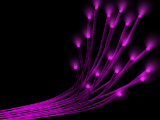IMDEA Networks

Understanding Capacity Scaling through Dense Deployments in Future Radio Access Networks

David López-Pérez, Senior Research Scientist at Bell Labs Alcatel-Lucent (ALU), Dublin, UK
External Presentation (External Speaker)
Today’s heterogeneous networks comprised of mostly macro cells and indoor small cells will not be able to meet the upcoming traffic demands. Indeed, it is forecasted that at least a 100x network capacity increase will be required to meet the traffic demands in 2020. As a result, vendors and operators are now looking at using every tool at hand to improve network capacity. In this epic campaign, three paradigms are noteworthy, i.e., network densification, the use of higher frequency bands and spectral efficiency enhancement techniques. This talk aims at proving understanding and analyzing the potential gains and limitations of these three paradigms, together with the impact of idle mode capabilities at the small cells as well as the user equipment density and distribution in outdoor scenarios. Special attention is paid to network densification and its implications when transiting to ultra-dense small cell deployments.
About David López-Pérez
David Lopez-Perez is a Member of Technical Staff at Bell Laboratories, Nokia, and his main research interests are in HetNets, small cells, interference and mobility management as well as network optimization and simulation. Prior to this, David obtained his PhD on Wireless Communications from the University of Bedfordshire, UK in 20111 and has been with Vodafone (Spain), NTT DOCOMO (CA), and King’s College London (UK). For his research, publications and patent contributions, David is a recipient of both the Bell Labs Alcatel-Lucent Award of Excellence and Certificate of Outstanding Achievement, and was also finalist for the Scientist of the Year prize in The Irish Laboratory Awards. David has also been awarded as PhD Marie-Curie Fellow in 2007 and Exemplary Reviewer for IEEE Communications Letters in 2011. David has published two books and more than 75 book chapters, journal and conference papers and filed more than 30 patents applications. He has been editor and TCP of a number of IEEE special issues, conference and workshops.
This event will be conducted in English

